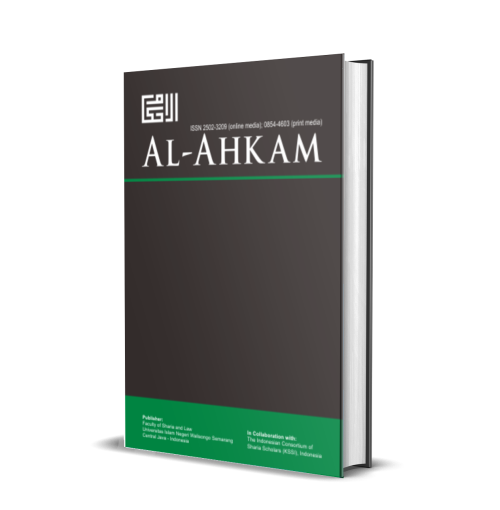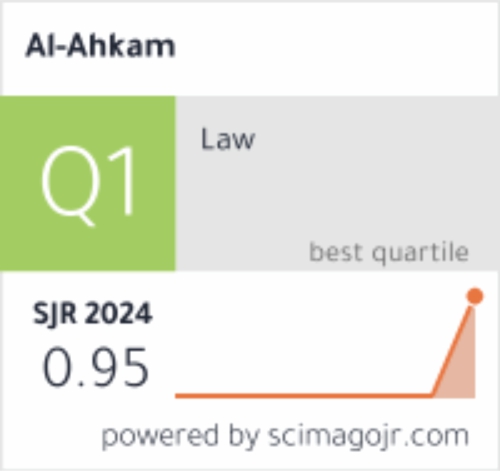FATWA MUI TENTANG VASEKTOMI Tanggapan Ulama dan Dampaknya terhadap Peningkatan Medis Operasi Pria (MOP)
DOI:
https://doi.org/10.21580/ahkam.2014.24.1.134Keywords:
fatwa, Majelis Ulama Indonesia, vasektomiAbstract
This field research aims to determine three things: the background of the changing fatwa MUI on Vasectomy from ‘haram’ to ‘halal on condition’; responses from the Moslem scholars; and the impact of fatwa on increasing the number of Vasectomy participants in Central Java. The data collection was done by using documentation and interviews while data analysis was done by using descriptive qualitative method. The results of this research are: 1) The reason for the changing fatwa on Vasectomy from ‘haram’ to ‘halal on condition’ is due to a new ‘illat, namely the success of recanalization. 2) Against the new fatwa, Ulama Muhammadiyah approved it by tightening and adding certain requirements. While Ulama NU disagree on the fatwa as evidence of the success of recanalization is considered not convincing (muhaqqaqah). 3) The new fatwa has not been an impact on increasing the number of Vasectomy participants in Central Java.Downloads
References
Badrān, Abū al-‘Aynayn, Uṣūl al-Fiqh al-Islāmī, Iskandariyah: Mu’assasah Shabāb al-Jāmi’ah, 1984.
Bisri, Cik Hasan, Pilar-pilar Penelitian Hukum Islam dan Pranata Sosial, Jakarta:RajaGrafindo Persada, 2004.
BKKBN, Informasi Pelayanan Kategori Mantap Pria (Vasektomi), Jakarta: BKKBN, 2011.
al-Ghazālī, Abū Ḥāmid Muḥammad ibn Muḥammad, al-Mustaṣfā min ‘Ilm al-Uṣūl, Jilid 2, t.t.p.: Dār al-Fikr, t.th.
al-Haq, Jād, “Ra’y al-Dīn fi Tanḍīm al-Usrah”, dalam Majalah al-Taṣawwur fī ’l-Islām, No. 21, 1980.
Ḥazm, Ibn, al-Muḥallā, Kairo: al-Ṭibā’ah al-Munīriyyah, 1352.
Jād al-Ḥaq, “Ra’y ad-Dīn fī Tanzīm al-Usrah”, dalam Majalah al-Taṣawwur fī ’l-Islām, No. 21, 1980
Madhkūr, Nazrat al-Islām ilā Tanẓīm al-Nasl, Kairo: Dār al-Nahḍah al-‘Arabiyyah, 1965.
Mudzhar, M. Atho’, Fatwa-fatwa MUI: Sebuah Studi tentang Pemikiran Hukum Islam di Indonesia Tahun 1975-1988, Jakarta: INIS, 1993.
Mudzhar, M. Atho’, Pendekatan Studi Islam dalam Teori dan Praktek, Yogyakarta: Pustaka Pelajar, 2002.
MUI, Himpunan Fatwa MUI, Jakarta: Ditjen BIPH Depag RI, 2003.
MUI, Himpunan Fatwa MUI, Jakarta: Ditjen BIPH Depag RI, 2010.
MUI, Himpunan Fatwa MUI, Jakarta: Ditjen BIPH Depag RI, 2011.
MUI, Keputusan Ijtima’ Ulama Komisi Fatwa se-Indonesia III, Jakarta: MUI, 2009.
MUI, Keputusan Ijtima’ Ulama Komisi Fatwa se-Indonesia IV, Jakarta: MUI, 2012.
‘Omran, Abd. al-Rahim, Islam & KB, (terj. dari Family Planning in the Legacy of Islam, London & New York, Routledge), Jakarta: Lentera Basritama, 1992.
Rosjidi, Ajip, (ed.), Ensiklopedi Indonesia 2, Jakarta: Ichtiar Baru Van Hoeve, 1991.
Sābiq, Shaykh Sayyid, Fiqh al-Sunnah, Kuwait: Dār al-Bayān, 1968.
Shalṭuṭ, Shaykh Mahmūd, Fatwa, Kairo: al-Azhar Press, 1959.
Shamsuddin, Shaykh M., “Tahdidi” dalam Rabat Proceeding, Rabat: IPPF, 1967.
Shamsuddin, Shaykh M., “Abortion and Sterilization” dalam Rabat Proceeding, Rabat: IPPF, 1967.
Syarifuddin, Amir, Ushul Fiqh, Jakarta: Logos Wacana Ilmu, 1999.
Yahya, Mukhtar dan Fatchurrahman, Dasar-dasar Pembinaan Hukum Fikih Islam, Bandung: al-Ma’arif, 1986.
Yunus, H. Mahmud, Kamus Arab-Indonesia, Jakarta: Yayasan Penyelenggara Penterjemah/Pentafsir al-Qur’an, 1973.
Downloads
Published
How to Cite
Issue
Section
License
By submitting an article to the journal, the author(s) agree to transfer the published article's copyright to the journal, which will act as the publisher. This means the journal will have the right to publish the article in various forms, including reprints. The journal will maintain the publishing rights to the published articles.
In line with the license, authors and third parties (readers, researchers, and others) are allowed to share and adapt the material. In addition, the material must be given appropriate credit, provided with a link to the license, and indicated if changes were made. If authors remix, transform or build upon the material, authors must distribute their contributions under the same license as the original.




